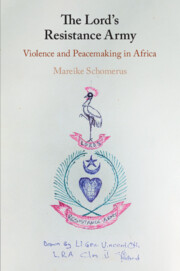Book contents
- The Lord’s Resistance Army
- The Lord’s Resistance Army
- Copyright page
- Contents
- Figures
- Acknowledgements
- Note on the Text
- Abbreviations and Acronyms
- 1 Introduction
- 2 The Lord’s Resistance Army
- 3 The Juba Peace Talks with the Lord’s Resistance Army in 2006
- 4 ‘Am I an Animal?’
- 5 The Juba Peace Talks with the Lord’s Resistance Army in 2007
- 6 ‘Reach Out a Hand and Pull It Back’
- 7 The Juba Peace Talks with the Lord’s Resistance Army in 2008
- 8 ‘LRA Has Already Become a System’
- 9 ‘We Are All Learning in This Peace Process’
- References
- Index
6 - ‘Reach Out a Hand and Pull It Back’
The Lord’s Resistance Army’s ‘Connect/Disconnect’ Meets International Galvanic Surges
Published online by Cambridge University Press: 09 April 2021
- The Lord’s Resistance Army
- The Lord’s Resistance Army
- Copyright page
- Contents
- Figures
- Acknowledgements
- Note on the Text
- Abbreviations and Acronyms
- 1 Introduction
- 2 The Lord’s Resistance Army
- 3 The Juba Peace Talks with the Lord’s Resistance Army in 2006
- 4 ‘Am I an Animal?’
- 5 The Juba Peace Talks with the Lord’s Resistance Army in 2007
- 6 ‘Reach Out a Hand and Pull It Back’
- 7 The Juba Peace Talks with the Lord’s Resistance Army in 2008
- 8 ‘LRA Has Already Become a System’
- 9 ‘We Are All Learning in This Peace Process’
- References
- Index
Summary
This chapter introduces two concepts to understand the dynamics at the Juba Peace Talks between the Lord’s Resistance Army/Movement (LRA/M) and the Government of Uganda. For the LRA/M, the main way of approaching the talks was through a mechanism of ‘connect/disconnect’. The LRA/M progressed by alternating its levels of engagement and kept control by maintaining a fluid, often a vague process. Progress and change came through reaching out in certain moments; control was maintained by pulling back in others. In contrast, international actors supporting the Juba Peace Talks function on a mechanism of ‘galvanic surges’: To continue support to the talks needed continuously developing momentum and consensus to remain committed to the peace talks. Running in parallel, the two approaches created a syncopated rhythm. Profound misinterpretation occurred in moments when external momentum hit a period of lesser LRA/M engagement; at other times, strong LRA/M engagement did not coincide with external momentum. The two operational modes mismatched and thus outside support and reassurances for the process were withdrawn just when the LRA/M had entered a time of adjustment.
Keywords
- Type
- Chapter
- Information
- The Lord's Resistance ArmyViolence and Peacemaking in Africa, pp. 157 - 193Publisher: Cambridge University PressPrint publication year: 2021



